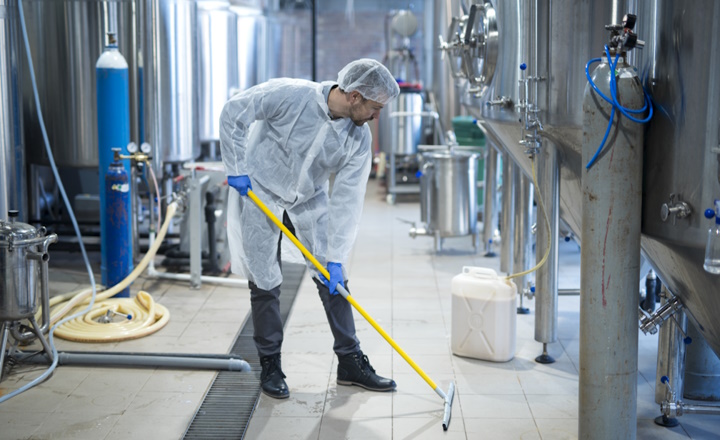
In any facility that processes consumables, cleanliness is non-negotiable. Food manufacturing cleaning plays a critical role in protecting product quality, meeting health regulations, and maintaining the reputation of a brand. Contamination, whether biological, chemical, or physical, can severely damage not only the final product but also public trust and legal standing. That’s why engaging experts in food manufacturing cleaning is essential for safe and compliant operations.
Why Food Manufacturing Cleaning Is More Than Just Surface Cleaning
Unlike regular commercial cleaning, food manufacturing cleaning is highly specialised. Facilities that process raw materials, cook food, or package goods are breeding grounds for bacteria and mould if not properly sanitised. The cleaning process must address the entire environment—floors, walls, equipment, drains, ventilation systems, and high-touch surfaces. This is not about just looking clean; it’s about being microbiologically safe.
Pathogen control is one of the main focuses in food manufacturing cleaning. Salmonella, E. coli, and Listeria can easily develop in poorly maintained environments and contaminate batches. Through deep cleaning, surface sanitisation, and microbial testing, these threats can be mitigated, keeping food products safe from production to packaging.
Regulations That Drive Food Manufacturing Cleaning Standards
In Australia, food manufacturing cleaning practices must align with the Food Standards Code and be regularly audited by local councils and third-party certifiers. Facilities are expected to have Hazard Analysis and Critical Control Points (HACCP) systems in place, which include scheduled cleaning routines as part of food safety protocols.
Cleaning teams must be trained in handling both wet and dry areas, identifying food contact and non-contact surfaces, and using approved chemicals that won’t leave behind harmful residues. In addition, records of cleaning tasks must be maintained for inspection to prove compliance and prevent legal complications.
Specialised Equipment and Techniques in Food Manufacturing Cleaning
One of the key differentiators in food manufacturing cleaning is the equipment used. High-pressure washers, steam cleaners, foamers, and specialised scrubbing tools are common. For dry food processing zones, dry ice blasting and vacuum cleaning may be used to avoid water contamination.
Each zone in a food manufacturing plant requires a different method. A meat processing unit will demand aggressive degreasing and sanitisation, while a confectionery plant may focus more on dust control and allergen management. Skilled cleaners know how to adjust their approach based on what is being manufactured in each area.
Avoiding Cross-Contamination with Professional Cleaning Routines
Cross-contamination is a constant risk in food facilities, especially where allergens or raw and cooked products are handled. A reliable food manufacturing cleaning team uses colour-coded tools and PPE, enforces hygiene entry barriers, and works in zones to ensure pathogens aren’t spread between areas.
Sanitisation scheduling is also crucial. Cleaning must often be done during shutdowns or in cycles to avoid interfering with production and to comply with safety rules. Some operations may require 24/7 rotating cleaning teams to keep up with demand.
Benefits of Outsourcing Food Manufacturing Cleaning
Many food businesses choose to outsource their food manufacturing cleaning to specialist companies. This brings several benefits: access to trained staff, the use of industry-compliant equipment, and consistent documentation for audits. It also reduces the internal burden of managing cleaning schedules, training, and compliance.
Professional providers also bring knowledge of emerging threats in the industry—such as resistant strains of bacteria or stricter legislative changes. This proactive approach ensures your facility remains ahead of issues before they escalate into production delays or health scares.
Tailored Cleaning Plans for Different Facilities
Every food facility is different. A seafood packaging plant will have different cleaning needs compared to a flour mill. A good food manufacturing cleaning provider will assess your space and create a customised cleaning plan based on risk areas, machinery types, production frequency, and regulatory needs.
This could involve a mix of daily cleaning, weekly deep cleaning, periodic equipment dismantling and sanitisation, or post-audit corrective cleaning. By designing a facility-specific program, cleaning becomes a strategic asset rather than a checkbox activity.
The Cost of Poor Food Manufacturing Cleaning
Cutting corners in cleaning can have catastrophic results. Product recalls, fines, shutdowns, or worse—consumer illness or death—can arise from lax hygiene. The cost of reactive damage control is significantly higher than investing in proper food manufacturing cleaning from the beginning.
Not only is the brand reputation at stake, but insurance premiums, legal fees, and employee morale can all take a hit. Keeping your facility clean is not just about appearances—it’s a critical control point in operational safety and success.
Sustainability in Food Manufacturing Cleaning
Modern food manufacturing cleaning practices also take into account sustainability. Using biodegradable or low-impact chemicals, optimising water usage, and investing in energy-efficient equipment can help facilities maintain high standards without excess environmental impact.
Some cleaning services offer green cleaning certifications, helping facilities meet ESG (Environmental, Social and Governance) goals while staying compliant. It’s possible to be safe, clean, and responsible all at once when the right protocols are followed.
Conclusion: Professional Food Manufacturing Cleaning Is Non-Negotiable
There’s no room for error in the food industry. A trusted food manufacturing cleaning process is a vital part of your operational backbone—protecting your product, your consumers, and your company. From compliance to contamination control, cleanliness is an investment that ensures your facility performs at its best every day.
| < Prev | Next > |
|---|







